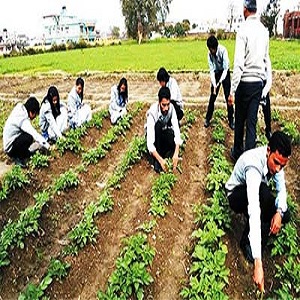The Role of Sustainability Education in Addressing Environmental Challenges in Agriculture

Our global food system's foundation is agriculture, which sustains billions of people. But it also makes a large contribution to problems with the environment such deforestation, soil erosion, water pollution, and greenhouse gas emissions. It is becoming more and more obvious that sustainable agricultural techniques are not a choice but a necessity as the globe struggles with the effects of climate change and the depletion of natural resources. In order to address these environmental issues and guarantee agriculture's long-term survival, sustainability education is crucial.
Farmers that take benefit from sustainability education can better understand how their farming operations affect the environment and get the resources they need to do so. They can make decisions that will ultimately result in a more sustainable agricultural system if we educate them on the significance of conservation, sustainable agriculture, and renewable energy sources. Let's now examine how sustainability education might help farmers overcome environmental issues.
Fostering Environmental Awareness
Agriculture-related people need to be made more environmentally aware as part of sustainability education. This understanding includes a thorough comprehension of the ecological processes that support agriculture, from soil health and biodiversity to water supplies and climatic patterns. Farmers and other agricultural professionals are better able to make choices that enhance sustainability by understanding the complex relationships between these components.
Having an awareness of the environment also means being aware of the negative effects of unsustainable agriculture methods. For instance, over use of chemical fertilizers and pesticides can kill beneficial insects and degrade soil, while excessive irrigation might deplete water supplies. Education on sustainability gives people the skills they need to recognize and lessen these effects, encouraging a more responsible approach to agriculture.
“In Asia, where agriculture is a major economic driver, education plays a pivotal role in enhancing productivity. Through targeted training programs, we can harness technology for efficient resource utilization.” Says Professor Rajesh Kumar, Agricultural Engineering
Encouraging Sustainable Farming Practices
Promoting the use of sustainable farming methods is one of the most concrete advantages of sustainability education. Farmers who have a better understanding of environmental processes can use ways to reduce their ecological impact. These techniques include precision agriculture, integrated pest management, crop rotation, and cover crops.
By interrupting the life cycles of pests and diseases, crop rotation, for example, not only minimizes soil depletion but also lowers the need for chemical inputs. Farmers are able to produce food more effectively and sustainably because to sustainability education, which highlights the significance of such methods and offers advice on how to put them into reality.
Promoting Responsible Resource Management
Responsible resource management is a key component of tackling the environmental concerns in agriculture, and it is a focus of effective sustainability education as well. This entails utilizing resources like water, energy, and land to their fullest potential while reducing waste and pollution. People who receive this type of education are better equipped to make judgments that are resource-efficient.
Farmers can learn about cutting-edge irrigation methods like drip irrigation and rainwater harvesting, which can drastically reduce water usage, in areas where there is a water shortage. The usage of solar-powered equipment is one example of a sustainable energy technique that can lower greenhouse gas emissions related to agriculture. Agricultural professionals are assisted in putting these techniques into practice by sustainability education, which promotes more responsible resource management.
Nurturing Innovation and Adaptation
The challenges brought by climate change, such as extreme weather occurrences, shifting growing seasons, and altered pest and disease patterns, do not exempt the agricultural sector. Education on sustainability is essential for empowering farmers to embrace these changes and promote agricultural innovation.
Education on sustainability helps farmers create resilient farming systems by educating them on climate science and adaption techniques. Crop diversification, purchasing climate-resilient cultivars, or using new technologies may all be necessary for this. Furthermore, by encouraging creativity, sustainability education can result in the creation of fresh, ecologically friendly agriculture methods that tackle contemporary problems.
Case Study: Sustainable Agriculture Training Programs
Let's look at a real-world scenario to show how sustainability education has a positive impact. Numerous organizations and institutions have created training programs in sustainable agriculture in recent years with the goal of educating farmers. The Sustainable Agriculture Research and Education (SARE) effort in the United States is one such initiative.
For farmers and agricultural professionals, SARE provides a variety of instructional materials, workshops, and grants. These sources include subjects including sustainable pest management, crop diversification, and soil health. Farmers can transition to more sustainable farming techniques by taking part in SARE initiatives, which give them access to useful knowledge and practical training.
Agriculture has complicated and numerous environmental problems, but sustainability education offers a glimmer of hope in our search for answers. Sustainability education gives those working in agriculture the skills they need to meet these challenges head-on by promoting environmental awareness, sustainable farming methods, responsible resource management, and innovation and adaptability.
Recognizing education's contribution to positive change is crucial as we move forward. Governments, agricultural groups, and academic institutions must continue to fund sustainability education programs to make sure that everyone has access to the information and abilities required for sustainable agriculture. By doing this, we may open the door for a more resilient and environmentally conscious agriculture industry that satisfies the needs of the future without sacrificing the present.

.jpg)